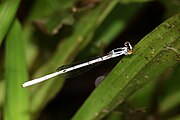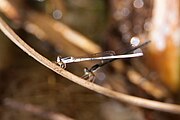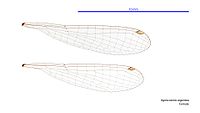Agriocnemis argentea
Appearance
(Redirected from Silver wisp)
| Silver wisp | |
|---|---|

| |
| Male, Queensland | |
| Scientific classification | |
| Domain: | Eukaryota |
| Kingdom: | Animalia |
| Phylum: | Arthropoda |
| Class: | Insecta |
| Order: | Odonata |
| Suborder: | Zygoptera |
| Family: | Coenagrionidae |
| Genus: | Agriocnemis |
| Species: | A. argentea
|
| Binomial name | |
| Agriocnemis argentea | |

| |
Agriocnemis argentea is a species of damselfly in the family Coenagrionidae,[3] commonly known as a silver wisp.[4] It is a small damselfly; the male, when mature, is covered in a white pruinescence.[4] It is endemic to northern Australia[5] where it inhabits both still and flowing waters.[6]
Etymology
[edit]The species name argentea is a Latin word meaning the colour of silver. In 1906 Robin Tillyard named this species of damselfly after the beautiful silvery white bloom covering of mature adults, which when flying ... appears as a bright silver streak, darting in and out of the grass.[2][7]
Gallery
[edit]-
Male Silver Wisp
-
Male in foreground
-
Female in background
-
Female wings
-
Male wings
See also
[edit]References
[edit]Wikimedia Commons has media related to Agriocnemis argentea.
- ^ Dow, R.A. (2017). "Agriocnemis argentea". IUCN Red List of Threatened Species. 2017: e.T87533167A87534056. doi:10.2305/IUCN.UK.2017-1.RLTS.T87533167A87534056.en. Retrieved 19 November 2021.
- ^ a b Tillyard, R.J. (1906). "New Australian species of the family Agrionidae (Neuroptera: Odonata)". Proceedings of the Linnean Society of New South Wales. 31: 177–194 [192] – via Biodiversity Heritage Library.
- ^ "Species Agriocnemis argentea (Tillyard, 1906)". Australian Faunal Directory. Australian Biological Resources Study. 2012. Retrieved 6 April 2017.
- ^ a b Theischinger, Günther; Hawking, John (2006). The Complete Field Guide to Dragonflies of Australia. Collingwood, Victoria, Australia: CSIRO Publishing. p. 100. ISBN 978-0-64309-073-6.
- ^ Watson, J.A.L.; Theischinger, G.; Abbey, H.M. (1991). The Australian Dragonflies: A Guide to the Identification, Distributions and Habitats of Australian Odonata. Melbourne: CSIRO. ISBN 0643051368.
- ^ Theischinger, Gunther; Endersby, Ian (2009). Identification Guide to the Australian Odonata (PDF). Department of Environment, Climate Change and Water NSW. p. 188. ISBN 978-1-74232-475-3.
- ^ Endersby, Ian; Fliedner, Heinrich (2015). The Naming of Australia's Dragonflies. Eltham, Victoria, Australia: Busybird Publishing. ISBN 9781925260625.






